Student Blog
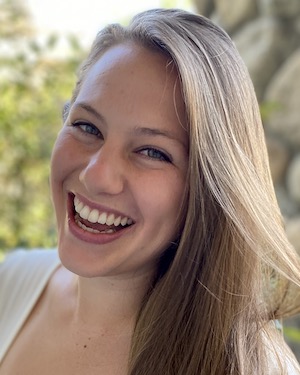
Learning to Lean on Others ⟩
December 23, 2020, by Savi
I got a text last night from one of my best friends in the program stating, “If I ever come to you seeking advice and you don’t have the mental capacity just let me know! And I seriously am here whenever you need advice or to vent!” To give you context to this message, earlier that day my friend had overheard me sigh heavily after looking at my phone. She asked what was wrong, and I explained that sometimes I just get overwhelmed by the number of people I feel like rely on me, even if deep down I know that they will be alright if I don’t answer their text or don’t help them problem-solve a solution to an issue. If friends, acquaintances, or family reach out to me, I know they believe I can help them and I feel compelled to go above and beyond in order to make their lives a little bit easier. I felt weird saying this out loud and immediately felt a sense of shame about believing that there was a lot of pressure on me to fulfill a role no one actually expects me to fulfill.
As occupational therapists, we are tasked with making meaningful occupations more accessible to our clients. I love my job, but I do find it difficult to switch off my “OT” lens/brain when I leave work or school.
I sat and tried to process how I could prevent this from happening and I soon came to terms with the fact that I will never fully feel like me unless I am there to listen to my friends or assist with problem-solving a solution to an issue they are experiencing. I feel honored to be someone that people feel comfortable confiding in and I take great pride in being there to help them better understand their worth, capabilities, and strengths.
For that reason, I have decided to focus on the second part of my friend’s message: “I am here if you need me.” I am so willing to be there for others to help them overcome hurdles to participating in their meaningful occupations, but I rarely find myself reaching out to others when I need help myself. I immediately replied to my friend and told her that I will definitely take her up on her offer because I know she truly means it. I also know that every one of my friends and family would do the same and that I am not a nuisance to any of them. I am not myself without my meaningful occupations, and I typically refrain from participating in them if I am overwhelmed or stressed. If people in my life are willing to come and open up to me then I should be willing to do the same! That way we can all participate in the activities and occupations that make us feel whole again . . . I mean I am definitely not the best version of myself unless I go on a walk/run outside, take a warm shower, and get at least 7 hours of sleep.
So if you’re like me and you can’t seem to step away from the OT mindset even when you leave work, that is ok! Just know that you are surrounded by people who want to help you in the same way . . . even if they haven’t officially been trained to do it 😉. Know that you are not a burden and make sure that you are allowing yourself the opportunity to participate in the occupations that are most meaningful to you!
⋯
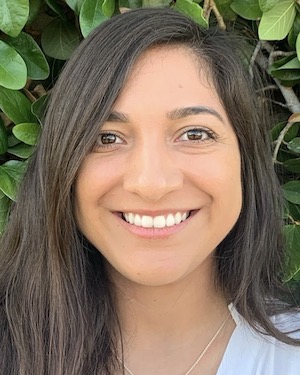
Working with the Community ⟩
December 21, 2020, by Liz
In one of my previous blog posts I shared a little bit about the community program that my colleague, and one of my dearest friends, Stephanie and I are leading together. The program is called Vivir Con Diabetes, and was initially developed by another occupational therapy student, David, as a part of the Albert Schweitzer Fellowship. In efforts of continuing the program, he mentored our very own Daniel Padilla, who then continued running the sessions the following year in collaboration with his colleague, Ceci. As you may all know, Daniel is now an OTD student and taking on other things as he works towards becoming Dr. Padilla. His colleague Ceci is also working on obtaining her OTD and is busy as she completes her residency at CHLA’s UCEDD. So now this year, Stephanie and I are running the program’s sessions.
To give you all more background, Vivir Con Diabetes is a program designed to support the Spanish-speaking community of Boyle Heights as they strive to make lifestyle changes in order to improve their diabetes management. Our goal is to implement culturally sensitive interventions as we support them in achieving their goal of better managing their diabetes. Our program site is the LAC+USC Wellness Center, which our participants are very familiar with because they utilize some of their other resources. I get a lot of questions from prospective students like “What kind of work do you get to do directly with the community?” “What are other ways to stay involved besides student organizations on campus?” “What kind of work do you directly get to do with the Latinx community?” Well, this is one of those ways in which I stay connected with my community all while using an OT lens.
Normally these sessions are held in person, but given the current situation we have been hosting them online. There are three sessions that take place Saturday mornings and are each 45 minutes long. It sounds like a long morning, but they really fly by! As we were discussing what we would be covering during the sessions and how they would be structured we had a few things to think about: would everyone that was interested in joining our classes have access to the internet? A computer? A cell phone? We really got to think about how much of an impact COVID-19 has had on our community, especially those who would come in-person to the Wellness Center with the goal of learning more about how to be more directly involved in their own health and care. Most of our participants tune in using their cell phones. Because Stephanie and I log in using our laptops, we had to learn a little more about how to instruct and guide our participants to unmute/turn their cameras on/off on their phones.
Stephanie and I touch on different topics every week and make sure that we relate them back to our participants’ diabetes management. We talk about things like:
- Sleep hygiene
- Chronic pain
- Stress management
- Physical activity — two weeks ago we did Zumba for 20 minutes, which was a hit!
- Communicating with one’s provider
- Mental health
These are just a few of the topics we cover, and as I mentioned before we always tie the topic back to diabetes management. For example, how does the stress created by family members and your provider affect your ability to manage your diabetes? How does the pressure of keeping your A1c levels low affect how you feel about yourself? How does it affect your relationships? Because our participants are Spanish-speaking and there’s already a low number of Latinx providers that they can relate to, our participants really love to share and talk to a group of people that understands — people that they can relate to.
I should mention that Stephanie and I aren’t just creating these lessons off the top of our heads! We get feedback from Dr. Diaz on our session outlines every week before introducing any content to our participants. Which brings me to my next point — mentorship. Aside from being able to work with the community, participating in this program has provided me with some great mentorship from Dr. Diaz. He continuously supports Stephanie and I by meeting with us on a weekly basis to go over our session outlines, any challenges we faced at our sessions, and also shares a ton of resources with us!
All in all it’s been such a great experience to be a part of this program. It’s something that I wish would have been available to help my grandmother with her diabetes management, and something that I think really makes a huge difference for our community in general. Speaking from my grandmother’s experience, she didn’t quite understand what it meant to have diabetes, didn’t know that there were so many lifestyle changes that could have helped her manage it, and also didn’t really feel comfortable asking her provider questions because she didn’t speak English. So, I am really passionate about supporting my community in any way possible.
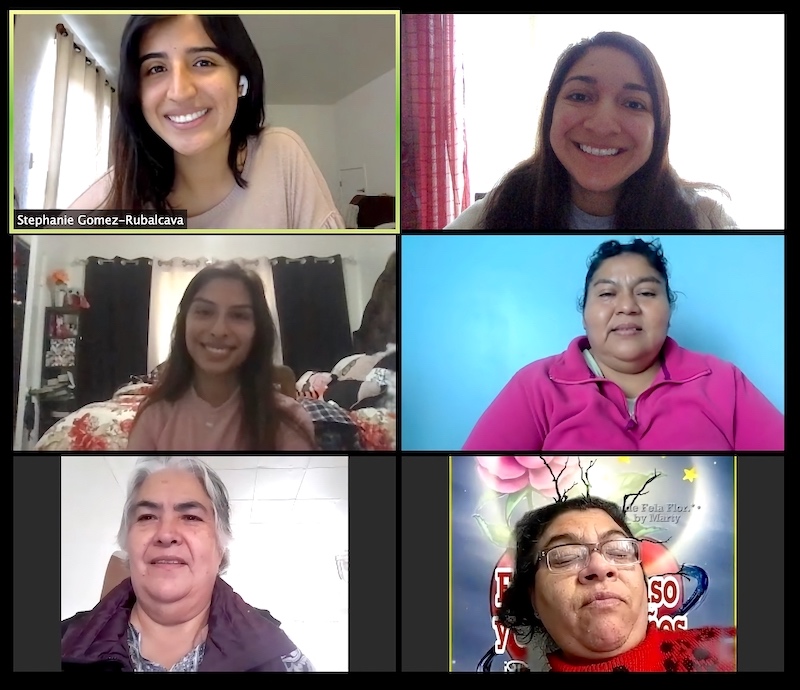
This past week was our last week of sessions for the semester. Here we are with some of our lovely participants from the 9 AM session! This photo was shared with participants’ permission.
I hope this was helpful for learning more about other ways in which you can stay involved and make a difference in the community. Please feel free to reach out to me if you have any questions about the program or about the Albert Schweitzer Fellowship! I would be happy to walk you through that application if you’re interested in applying for the following year. Fight on and happy holidays!
⋯
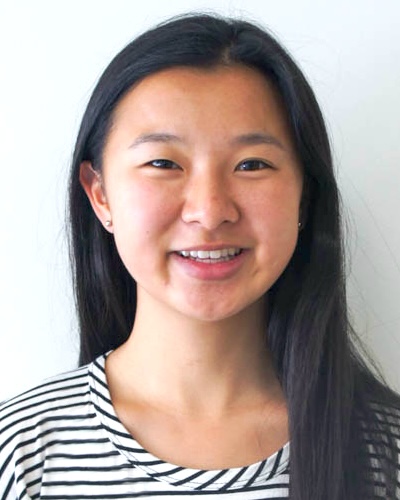
Ring In the Season ⟩
December 18, 2020, by Bethany
It’s December! The holiday season means it’s time for some of my favorite occupations. Personally, my family and I celebrate Christmas. I wanted to share some of the ways we start setting up for the holiday! Enjoy this poem about how I celebrate Christmas with my family:
The time has come to decorate,
Bring out the boxes. Yes, all eight.
The garland, wreaths, and Christmas tree, 🎄
And in the background: Mariah Carey
Sings her song with jingle bells. 🎶
So deck the halls, enjoy the smell
Of evergreen and peppermint.
Have hot chocolate with the remnants ☕
Of candy canes, whipped cream on top.
Because 70 is cold. Don’t tell me it’s not. ❄️
Take off the lids, open the box. 🎁
Untangle the snafu of Christmas stuff.
Lay out the garlands, row by row,
And check the lights! Make sure they glow. 🌟
The wreaths and garland are put up in style
Giving everyone who walks by a smile.
The Christmas cards are ready, too,
For all our family and friends to peruse. 👨👩👧👦
We tell them what happened in our year
And send them a little Christmas cheer.
Sealing all the envelopes ✉️
To exchange some love and hope.
When the cards are done, we snuggle up.
With flannel pajamas and another cup
Of hot chocolate. It’s movie time. 🎅
We argue between “Elf” and “It’s a Wonderful Life.”
The movie starts and brings that wonderful feeling.
That Christmas is here. So ring in the season. 🔔
Hope this gets you in the mood. Merry Christmas and Happy Holidays! ❤️
⋯
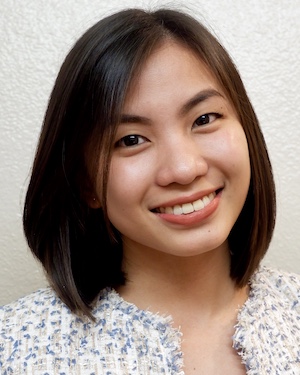
Yna’s Elective Experiences ⟩
December 16, 2020, by Yna
One thing that I was most excited about studying at USC Chan is getting to explore the variety of elective courses that they offer. This is certainly a great opportunity to specialize in whatever field of OT you are most interested to pursue. It certainly was not an easy decision for me; and if you find yourself in that same situation, that’s totally okay! I hope this blog will help you as I talk about some highlights of my elective experiences for the fall semester, and why I chose them.
OT 573: Hand Rehabilitation
While I was working as an OT in an adult rehabilitation setting in the Philippines, I had a lot of clients with hand-related injuries. It was during this time when I gained a better appreciation of the complexity of the hands and their importance in daily living — which led me to choose to take this course. Through this elective, I gained in-depth knowledge of the anatomy of the hands and upper extremity primarily through the elaborate reading materials alongside supplementary learning activities such as informative videos. Other topics that were covered in this class included wound healing, scar and edema management, digital splinting, and casting, which was done in-person as can be seen in the photos below!
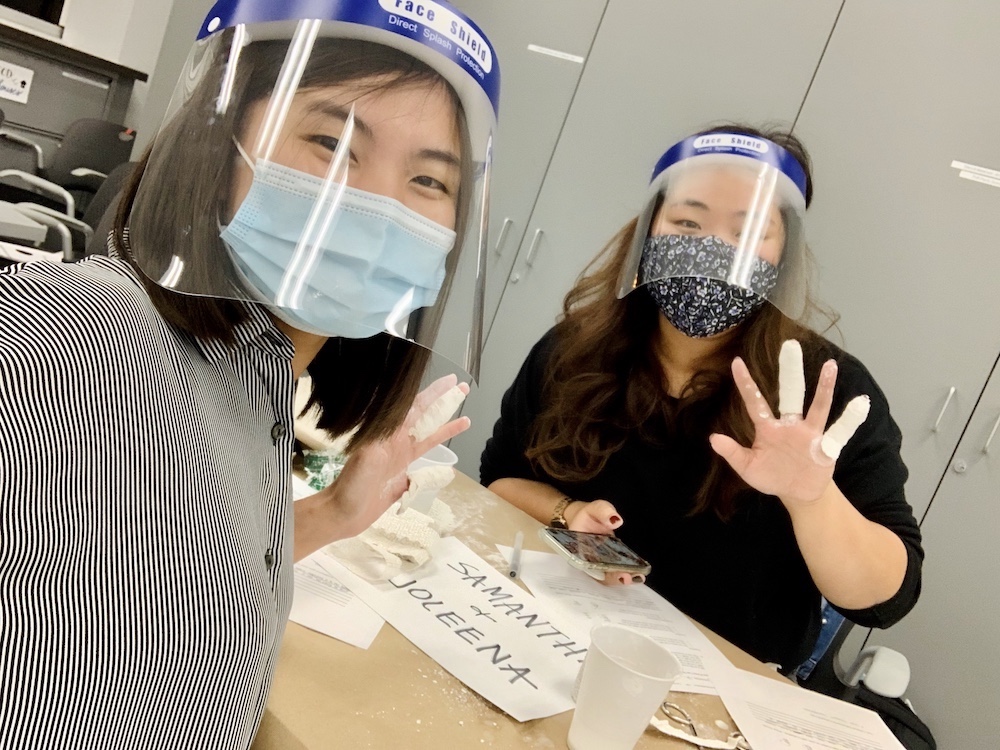
Me and my partner Sammy during digital casting lab class
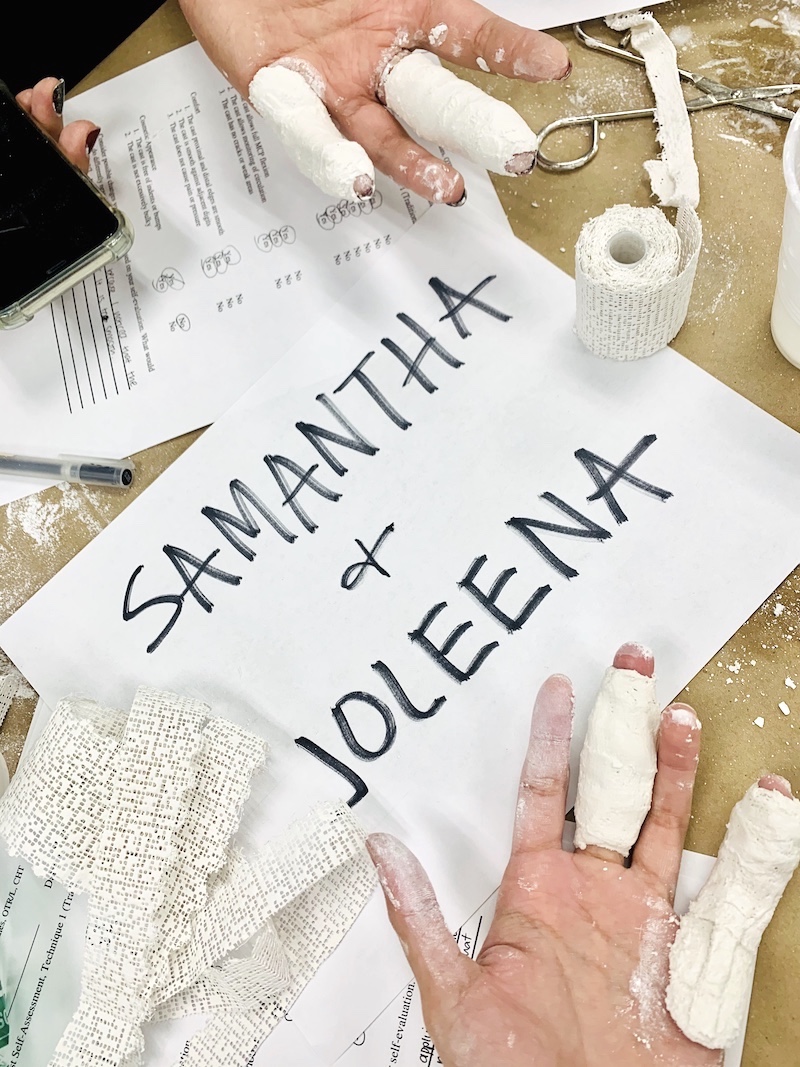
Showing off the digital casts we fabricated for each other
I definitely learned a lot from this course but one major takeaway that I will never forget is Lisa Deshaies’ (our professor) motto which she likes to abbreviate as FOFO, which stands for “Fight On For Occupations.”
OT 562: Advanced Hand Rehabilitation and Certification (Physical Agent Modalities)
A co-requisite of this course is the OT573 Hand Rehabilitation elective I just discussed above. Now that I have the knowledge that I need about hands and the upper extremity, I decided to further my knowledge on the application of Physical Agent Modalities (PAMs) as a preparatory activity for occupation. Each week, we examined a different modality (i.e., heat, ultrasound, TENS, etc.), discussing each of the modality’s purpose, methods, precautions, contraindications, and application in practice. I gained a lot of insights from my classmates during small group discussions. After taking this class, I feel more adept in writing SOAP notes and engaging in evidence-based practice. Another reason why I chose this elective is because the hours that I earned in class are applicable towards the California Board of OT educational requirements for advanced practice. Our professors, Janice Rocker and André Woo prepared us well for this application by training us all on how to properly fill out the advanced practice application form to make sure that we are ready when the time comes.
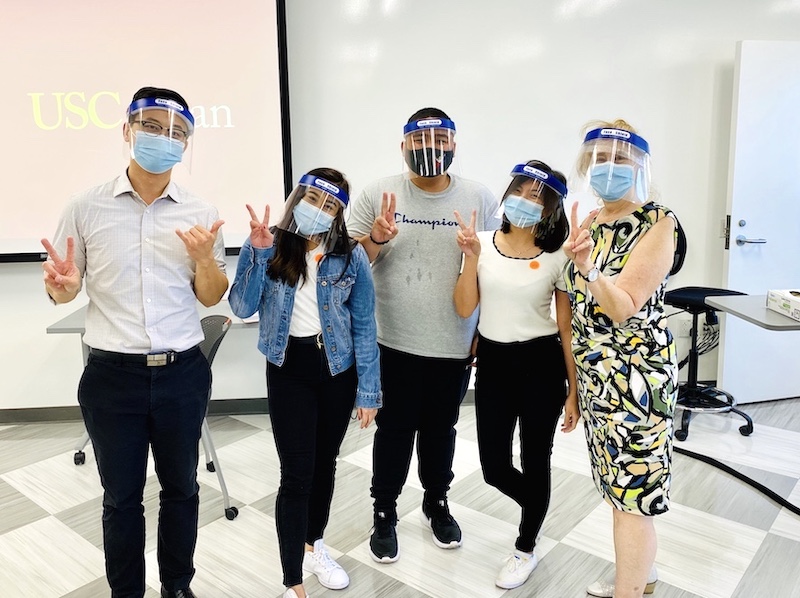
Me with my classmates Erika and Elmo and our professors Janice (rightmost) and Andre (leftmost)
OT cinco seis seis (OT 566): Healthcare Communication with Spanish-Speaking Clients
Besides already having a little bit of background in speaking Spanish, I took this course with the goal of being able to communicate effectively with Spanish speaking clients I may have in the future. Although I may not be able to speak it really fluently yet, I believe the mere fact that you’re making an effort makes a difference in creating a safe space for them, consequently helping in the establishment of client-therapist rapport. The focus of the course is learning Spanish words and phrases within a therapeutic context, so I learned how to speak basic sentences that we usually say during therapy sessions such as when introducing yourself: “Mi nombre es Yna y yo soy su terapeuta ocupacional.” Our professor, Dr. Delgado, provided us with various avenues to practice our skills through group work, practicum, assignments—including one wherein we have to use an app that tracks our progress weekly.
⋯

Overcoming Rejection and Feelings of Inadequecy ⟩
December 9, 2020, by Savi
Classes Getting Involved Life Hacks
As my last semester of classes has come to an end, I had anticipated feeling relieved. I now sit here, having passed all of the courses I need to graduate from this Master’s program, feeling immensely overwhelmed and discouraged. Up until this moment, everything had been mapped out for me. Each class that I would take and when I would take them were pre-determined. I knew that I just had to work hard and do my best in order to be successful academically.
I am currently studying for the COMPS (comprehensive exam) that I will be taking on December 15th with the rest of my graduating class and I am worrying about my future. This future is not pre-determined and it is scary, especially amidst a global pandemic. It is up to me to pave the way.
During this hectic time, I have also decided to pursue my OTD. After going through the interview process for the USC Chan Division residencies and being informed that I did not receive one, I felt extremely discouraged. I took this rejection as an indication that I was not good enough to get the opportunities I had been aiming for. I became anxious over the fact that I would have to find my own residency, especially because I was worried that my lack of experience in my field of choice would prevent me not only from getting a residency but also a fieldwork II experience.
This stress and feeling of inadequacy was something that was difficult to overcome. After sitting back and reflecting, I came to realize that I was letting one rejection skew my view of my self-worth and capabilities . . . just one rejection held that much power over me!
It wasn’t until I realized that if I didn’t believe in myself then who would!? I decided that if I didn’t try my best to go after the positions and experiences I feel like I deserve and want then I would regret it tremendously. I couldn’t let one rejection deplete my confidence and I knew that even if there were more rejections to come I would learn from them and keep moving forward.
I spent the coming weeks being polite and persistent. I began communicating with people who could help me develop the residency position of my dreams. Putting all the pieces together was tricky, and it took a lot of persistence to progress things further. Advocating for myself and my worth was key in progressing things forward, as well as acknowledging the work and effort the people communicating with me were putting in.
Your future is what you make of it. Be persistent, confident, understanding, and kind. Know that the person you are talking to will never know the mark you can make if you don’t advocate for yourself and your worth. Don’t let rejection take a toll on you. Sometimes putting in the extra work to make things happen really pays off! Advocate for yourself and believe in yourself because no one can do it better than you.
⋯





